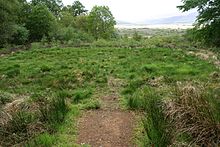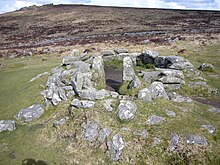Hut circle

A hut circle in Torr Righ, Arran, Scotland
In archeology, a hut circle is a circular or oval depression in the ground with evidence of a low stone wall around it that used to be the foundation of a round house. The superstructure of such a house would have been made of timber and thatch. They are numerous in parts of upland Britain and most date to around the 2nd century BC.[1]
Hut circles are usually around 5 to 25 feet in internal diameter, with the rocks themselves being 2-3 feet wide and around 3 feet high. Hut circles were also almost certainly covered by conical rounded roofs and supported by posts that were internal and sometimes external.[2]
Southwest England

Grimspound on Dartmoor, a late Bronze Age settlement
Hut circles are particularly numerous on Dartmoor where there are an estimated 5,000, one of the best known sites being Grimspound. It is exceptionally well preserved owing to its solid stone construction, the numerous hut circles being enclosed by a stone wall. It dates to the Late Bronze Age.[3]

One of Grimspound's hut circles
It was first settled about 1300 BC. The 24 hut circles are surrounded by a massive granite perimeter wall, which may have stood at 1.7 metres in places. The roundhouses, with an average diameter of 3.4 metres, were each built of a double ring of granite slabs with a rubble infill – a technique still used in dry-stone walling. one, Hut 3, has a surviving porchway, with the two jamb stones still upright, although the lintel has fallen. There is good evidence of human activity: pottery, scrapers, and pot boilers were found in the huts during Victorian excavations. However, little organic artefacts survived in the acidic soil. Ashes were found at a central hearth in each hut.
Scotland
Hut circles also occur in Northern Scotland, but it is unclear if there is a connection between these and the hut circles in England. These hut circles were usually in pairs, and surrounded by groups of tumuli of sepulchral origin. These hut circles were around 40 feet in diameter and 20-30 yards apart.[4]
References
| Wikimedia Commons has media related to Hut circle. |
^ Darvill, Timothy (2008). Oxford Concise Dictionary of Archaeology, 2nd ed., Oxford University Press, Oxford and New York, p. 202. .mw-parser-output cite.citation{font-style:inherit}.mw-parser-output .citation q{quotes:"""""""'""'"}.mw-parser-output .citation .cs1-lock-free a{background:url("//upload.wikimedia.org/wikipedia/commons/thumb/6/65/Lock-green.svg/9px-Lock-green.svg.png")no-repeat;background-position:right .1em center}.mw-parser-output .citation .cs1-lock-limited a,.mw-parser-output .citation .cs1-lock-registration a{background:url("//upload.wikimedia.org/wikipedia/commons/thumb/d/d6/Lock-gray-alt-2.svg/9px-Lock-gray-alt-2.svg.png")no-repeat;background-position:right .1em center}.mw-parser-output .citation .cs1-lock-subscription a{background:url("//upload.wikimedia.org/wikipedia/commons/thumb/a/aa/Lock-red-alt-2.svg/9px-Lock-red-alt-2.svg.png")no-repeat;background-position:right .1em center}.mw-parser-output .cs1-subscription,.mw-parser-output .cs1-registration{color:#555}.mw-parser-output .cs1-subscription span,.mw-parser-output .cs1-registration span{border-bottom:1px dotted;cursor:help}.mw-parser-output .cs1-ws-icon a{background:url("//upload.wikimedia.org/wikipedia/commons/thumb/4/4c/Wikisource-logo.svg/12px-Wikisource-logo.svg.png")no-repeat;background-position:right .1em center}.mw-parser-output code.cs1-code{color:inherit;background:inherit;border:inherit;padding:inherit}.mw-parser-output .cs1-hidden-error{display:none;font-size:100%}.mw-parser-output .cs1-visible-error{font-size:100%}.mw-parser-output .cs1-maint{display:none;color:#33aa33;margin-left:0.3em}.mw-parser-output .cs1-subscription,.mw-parser-output .cs1-registration,.mw-parser-output .cs1-format{font-size:95%}.mw-parser-output .cs1-kern-left,.mw-parser-output .cs1-kern-wl-left{padding-left:0.2em}.mw-parser-output .cs1-kern-right,.mw-parser-output .cs1-kern-wl-right{padding-right:0.2em}
ISBN 978-0-19-953404-3.
^ W. J. Hemp and C. A. Gresham (1944). Hut-circles in North-west Wales. Antiquity, 18, pp 183-196. doi:10.1017/S0003598X00018627.
^ The Roundhouses of Dartmoor at www.legendarydartmoor.co.uk. Accessed on 3 Sep 2013
^ Roberts, G. (1865). Some further notes upon pre-historic hut-circles. Journal of the Anthropological Society of London, 3, lx-lxv
This article relating to archaeology is a stub. You can help Wikipedia by expanding it. |